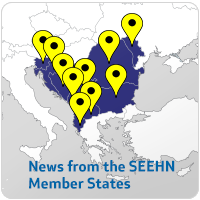
On February 25, a Regional Webinar “What is currently known about countering misinformation and resilience against misinformation” was held in a virtual format.
Information literacy proves to be a critical resource and the role of nurses in combating COVID-19 related misinformation is now important more than ever.
The webinar aimed at providing valuable insights on tools to guide the communities through a minefield of misinformation during these challenging times.
Three panellists: Ms. Tina D Purnat, Technical Officer, Digital Health Technologies, WHO Supporting WHO COVID-19 Infodemic response pillar discussed on “Infodemic management as a function of health emergency preparedness and community resilience”; Mr. Radoje Cerović, Psychologist and Communication Expert, Digital Transformation strategist presented “Crisis and Risk Communication: Montenegro case study” ; and Ms Einav Shimron, SEEHN National Health Coordinator Deputy Director General for Media and International Relations, Ministry of Health, Israel shared the “Israeli experience on the topic”.
They explored in-depth the barriers and the enablers to countering mis- and disinformation and examined best practices for tackling the phenomena by stressing the importance of trustworthiness of information and also discussed how to make societies more resilient to the aggressive infodemia.
In her opening remarks, the Director of the SEEHN Secretariat Dr Mira Dasic stressed once again the crucial role played by the primary health care nurses stating that: “The primary health care Nurses are at the forefront of COVID-19 response, especially at this stage with their double contribution: they provide care and play a critical role in emergency risk reduction, preparedness and response and, at the same time, nurses are expected to ensure the COVID-19 vaccination system”.
Mr Gian Matteo Apuzzo, Senior expert and project manager, on behalf of Central European Initiative (CEI) Executive Secretariat, stressed the tremendous importance of communication during a pandemic. He also praised SEEHN to be one successful implementer of the health emergency response projects that CEI commissioned last year to help countries with in their COVID-19 response.
Ms Purnat, highlighted the key drivers that shall shape the approaches in social listening. “Three aspects should be considered by authorities in managing infodemia: (1) accountability to communities we work with, (2) our commitment to evaluation, and (3) supporting community resilience”.
Mr Cerovic through the Montenegrin case study presented the developed communication strategy and approaches on how to counter misinformation.
Ms Shimron reflected on the benefits of the community specificities-based approach in tackling the impact of fake news and the importance of using trust frameworks and opinion leaders in messaging and tailoring the message in the native language of the communities.
This event was also the final activity of the project “Strengthening capacities of nurses – front line healthcare workers during the COVID-19 response – Strong nurses for strong health systems and a healthier world” funded by CEI and implemented by the SEEHN Secretariat.





